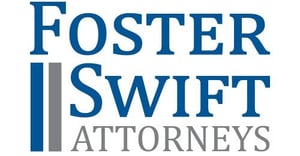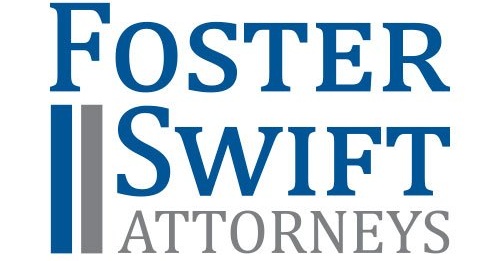
Chris Holman welcomes back Anthony Dalimonte, Attorney, Foster Swift Collins & Smith PC, Southfield, MI, one of Foster Swift's six branches across Michigan.
Watch Anthony and Chris discuss discusses the implications of the new FTC rule banning non-compete agreements, highlighting its impact on businesses in Michigan and the likelihood of legal challenges, in the YouTube video shared below:
In their conversation, Chris looked to find out several things from Anthony;
Tell us about the new FTC rule banning non-competes?
· FTC voted April 23, 2024 3-2 to publish its final rule banning all non-compete agreements.
· The rule states that non-compete agreements violate Section 5 of the FTC Act. All non-compete agreements signed after the effective date will be illegal and violate federal law.
· FTC defines “non-compete clause” as a term or condition of employment that either “prohibits” a worker from, “penalizes” a worker for, or “functions to prevent” a worker from (A) seeking or accepting work in the United States with a different person where such work would begin after the conclusion of the employment that includes the term or condition; or (B) operating a business in the United States after the conclusion of the employment that includes the term or condition.
· Effective date is 120 days after the rule is published in the federal register, which has not happened yet so sometime in September.
· All non-compete agreements signed BEFORE the effective date are also unenforceable EXCEPT for non-competes that were signed by “Senior Executives”.
What led to the FTC to vote to approve the final rule 3-2?
· The FTC commissioners voted along party lines, so we knew this was going to be passed. The dissenting republican commissioners sort of previewed the basis for the challenge – that the FTC does not have the authority to make sweeping law changes.
Does the FTC tell us who a senior executive is?
· Senior executive is someone who makes over $151,164 and are in a “policy-making” position.
· FTC says that less than 1% of employees fall into this category. Theory, according to the FTC, is that non-competes are typically less coercive with “senior executives” because more likely to be negotiated and often with the assistance of a lawyer.
If an employee signed a non-compete and they aren’t a senior executive, what happens?
· Non-compete is unenforceable AND employers have to give notice to employees that states they will not enforce any non-compete clause against you.
· FTC provided model language that basically says you may seek to accept a job with any company or person, even if they compete with the company. You may run your own
business, even if it competes with X company. And you may compete with X company following your employment with that employer.
Are there any exceptions?
· This rule does not apply where a person enters into a bona fide sale of a business entity.
· This is a change from the proposed rule that came out last year where the FTC said you have to be selling at least 25% of business.
Is this limited to only non-compete clauses?
· In general, yes.
· BUT the FTC says that if other overly broad clauses that prohibit or penalize a worker or “functions to prevent” a worker from working with someone else or starting their own business after they leave their job could be considered a “non-compete” clause.
· So the FTC says Non-disclosure agreements, confidentiality agreements, non-solicitation agreements are still enforceable. Unless they are so broad and onerous that it acts as a “functional non-compete”. The FTC basically says this is a case by case basis.
Is this going to be challenged?
· Yes, it was challenged almost immediately in the Eastern District of Texas by one business group.. The US Chamber of Commerce also filed a lawsuit, and the Court is likely to join these two lawsuits together. So we will be watching this closely.
· The arguments against the rule are that the FTC lacks the power to make federal law changing the laws of almost every state in the county, despite being a federal agency.
In a practical sense how will this impact businesses across Michigan?
· If it goes into effect, it supersedes conflicting state law so non-competes will be banned in Michigan.
How likely is this to be the final standing on the issue?
· The lawsuits currently filed largely focus on lack of statutory authority for the FTC to enact sweeping law that affects millions. While there are no guarantees, there is a significant chance of the rule being enjoined before it goes into effect.
Anthony was co-author of a recent article on this topic found on the Foster Swift website:
Federal Trade Commission Prohibits Noncompete Agreements for Almost All U.S. Workers, Legal Challenges Expected
Michael R. Blum, Karl W. Butterer, Anthony M. Dalimonte and Clifford L. Hammond
Foster Swift Labor & Employment Law News E-blast
April 24, 2024
 The U.S. Federal Trade Commission (FTC) issued a final rule yesterday (April 23, 2024) to take effect in 120 days prohibiting most noncompete agreements between employers and workers.
The U.S. Federal Trade Commission (FTC) issued a final rule yesterday (April 23, 2024) to take effect in 120 days prohibiting most noncompete agreements between employers and workers.
The basics for understanding the final rule include:
- The new rule would ban almost all noncompete agreements in effect and require companies to inform current and former employees that their noncompete agreements will no longer be enforced.
- Some existing noncompete agreements covering “senior executives” can remain in effect, but employers will be banned from imposing any new noncompete agreements on their senior executives going forward.
- Some noncompete agreements entered into as part of a sale of a business entity, including a person’s sale of their ownership interest in a business entity, remain enforceable.
- Certain industries the FTC does not regulate are exempt from the rule, including nonprofit organizations, airlines, banks, credit unions and insurance companies.
- Several states have already passed laws banning or restricting noncompete agreements including California, Colorado, Minnesota, North Dakota and Oklahoma. If implemented, the new rule will override all state laws, regulations or orders that conflict with the FTC’s regulations.
The FTC approved the new rule on 3-2 vote along party lines. The Commission says the new regulations will ensure that American workers have the freedom to pursue a new job, start a new business or introduce a new product or service to the market.
Legal Challenges to Noncompete Rule Are Certain
A group of business advocates representing an array of industries and interests have criticized the final rule since it was proposed over a year ago. They claim noncompetes are a critical tool that is important to protecting trade secrets and they actually increase competition.
The U.S. Chamber of Commerce, the country’s preeminent pro-business group, has said it will commence legal action against the FTC over the final rule. According to the Chamber, its suit will argue that the Commission lacks the full legal authority to issue the final rule and will ask a federal court to invalidate it.
The FTC counters this argument by noting that its legal authority to regulate business activity stems directly from the 110-year-old law that created the agency.
What Employers Need to Know About the New Noncompete Rule
The final rule is a sweeping measure that essentially bans the use of noncompete agreements for most U.S. workers. Some action steps recommended for employers include:
- Review Existing Noncompete Agreements – Employers should review all current noncompetes with employees. Except for a carve-out affecting some senior-level executives, the rule renders noncompete arrangements unenforceable.
- Review individual shareholder Stock Redemption Agreements for enforceable noncompetition clauses.
- Develop Alternative Strategies – The FTC acknowledges that many businesses must have mechanisms to protect confidential industry information and customer relationships. The agency recommends alternatives to the traditional noncompete agreement. These include agreements which prohibit ex-workers from accessing or utilizing defined trade secrets or specific customer lists for a set timeframe after they depart from the company.
- Open Communication and Transparency --The final rule requires employers to notify workers that they are no longer subject to their noncompete agreements. In addition to issuing compulsory notices, employers are recommended to take the opportunity to open a dialogue with workers on the topic and freely exchange information regarding the changes brought about by the new rule. Explain the rationale behind the move away from noncompetes and address questions and concerns about the way forward.
Under the Biden Administration, the FTC has adopted a more aggressive posture toward regulating corporate America. In addition to banning most non-competes through the FTC, increased regulation has been implemented through the National Labor Relations Board (NLRB), which has implemented several new or revised rules and is suing companies to enforce them. And in another action taken yesterday, the U.S. Department of Labor (DOL) announced another final rule, which will raise the minimum weekly salary to qualify to qualify for certain exemptions from overtime requirement of the Fair Labor Standards Act (FLSA) from $684/week ($35,568 annually) to $844/week ($$43,888 annually) by July 1, 2024, and to $1,128/week ($58,656 annually) by January 1, 2025.
These regulatory changes are subject to court challenges, but may result in significant operation changes and costs to companies. Companies should promptly begin reviewing their noncompete agreements, payroll processes and policies, and employment work rules.
The attorneys with Foster Swift’s Labor and Employment Practice Group have decades of experience with noncompete agreements and other restrictive covenants. They understand the details and nuances of the new FTC rules regarding these arrangements and can respond to any questions or concerns you may have. Please contact Michael Blum (mblum@fosterswift.com/248-785-4722) or another member of the firm’s Labor and Employment Practice Group.
» Visit MBN website: www.michiganbusinessnetwork.com/
» Watch MBN’s YouTube: www.youtube.com/@MichiganbusinessnetworkMBN
» Like MBN: www.facebook.com/mibiznetwork
» Follow MBN: twitter.com/MIBizNetwork/
» MBN Instagram: www.instagram.com/mibiznetwork/
Image courtesy of Foster Swift & Adobe Stock














